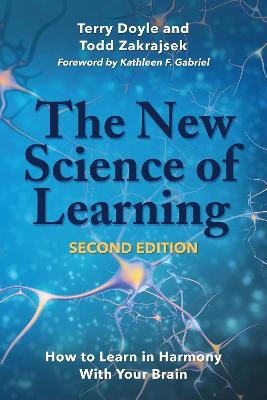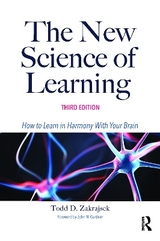
The New Science of Learning
Routledge (Verlag)
978-1-62036-657-8 (ISBN)
- Titel erscheint in neuer Auflage
- Artikel merken
Dr. John N. Gardner is an undergraduate student success thought leader and a social justice advocate. He is Chief Executive Officer and Chair of the non-profit, the John N. Gardner Institute for Excellence in Undergraduate Education, co-founded by him and his wife, Betsy O. Barefoot, in 1999. John is also Distinguished Professor Emeritus and Senior Fellow, University of South Carolina at Columbia. He was also the Founding Executive Director of both the National Resource Center for the First-Year Experience and Students in Transition, and the University 101 Programs. He also served as Vice Chancellor for Academic Affairs for the University's five Regional Campuses. Subscribe to the Office Hours with John Gardner: Innovation in Higher Education podcast. Todd D. Zakrajsek, PhD, is an associate professor in the Department of Family Medicine at UNC - Chapel Hill and President of the International Teaching Learning Cooperative (ITLC).Todd was a tenured associate professor of psychology and built faculty development efforts at three universities before joining UNC. At UNC he is an Associate Director of the Faculty Development Fellowship within the School of Medicine. Through his work with the ITLC, Todd directs five Lilly Conferences on Evidence-Based Teaching and Learning and also consults with a wide variety of campuses on topics related to teaching/learning, leadership, and scholarly activity.Todd has served on many educationally related boards and work groups, including The Journal of Excellence in College Teaching, International Journal for the Scholarship of Teaching and Learning, College Teaching, and Education in the Health Professions.He has consulted with organizations such as The American Council on Education (ACE), Lenovo Computer, Microsoft, and the Bill and Melinda Gates Foundation; and delivered keynote addresses and campus workshops at over 300 conferences and university campuses in 49 states and 12 countries.Todd publishes on topics pertaining to student learning, effective teaching, leadership, scholarly activity, and assessment. Todd’s recently co-authored books include Teaching for Learning (2nd Ed)(2021); Advancing Online Teaching (2021); The New Science of Learning (2nd Ed) (2019); and Dynamic Lecturing (2017). Check out Todd’s two TEDx talks here. You can follow and connect with him on Twitter @toddzakrajsek and LinkedIn.
Foreword Acknowledgements Introduction 1. Your Host 2. Where This Book Came From 3. The Structure of this Third Edition A Note to Students A Note To Faculty PART ONE. SET UP FOR SUCCESS 1 - Learning from Multiple Perspectives A. Perspective Taking B. Ubiquitous Struggles 1. First-Generation College Students 2. Recognizing Individuality 3. Disarming Microaggressions 4. Stereotype Threat 5. Implicit Bias 6. Summary of Biases C. From Uneasy to Understanding D. Equity, Equality, and Accommodations E. Engaged Learning 2 - Discovering Yourself as a Learner A. Self-Regulation 1. Establish a Habit of Success 2. Managing Emotions B. Self-Efficacy 1. Performance Outcomes 2. Vicarious Experiences 3. Verbal Persuasion 4. Physiological Feedback C. Imposter Syndrome D. Learned Optimism 3 - Developing Your Learning Strategy A. Set Goals 1. SMART Goals a. Specific b. Measurable c. Achievable d. Relevant e. Timely 2. Break Large Goals into Smaller Goals 3. Stretch Goals B. Manage Multiple Tasks 1. Build Your Schedule 2. Manage Your Schedule 3. To-Do Lists 4. Organization C. Effective Communication Patterns 1. Be an Active Listener 2. How to Address Faculty 3. Make Use of Office Hours 4. Emails to Faculty 5. Following Up 6. Making Requests D. Keep the Big Picture in Mind PART TWO. BUILD THE FOUNDATION 4. Facilitating Your Learning A. Theories and Models of Learning 1. Classical Conditioning 2. Operant Conditioning 3. Social Learning Theory B. Cognitive Load 1. Intrinsic Load 2. Extraneous Load 3. Germane Load a. Automaticity b. Schema Activation C. Deep Learning 1. Attention 2. Value 3. Understanding 4. Anticipate Success D. Foster a Better Memory 1. Memory Processes a. Encoding b. Consolidation c. Retrieval E. Memory Enhancements 1. Elaboration 2. Repetition 3. Interleaving 4. Spaced Recall 5 - Exploring Social Influences A. Mindset 1. The Origins of Fixed Mindedness 2. Spotting a Fixed Mindset 3. Mindsets are Context Specific 4. Views the World Based on Mindset 5. Shift to Growth Mindset B. Metacognition 1. Understanding Metacognition 2. Metacognitive Regulation C. Attribution 1. Intrinsic vs. Extrinsic 2. A Bit of Order 3. Fundamental Attribution Error D. Egocentric bias 6 - Finding and Using Patterns A. Patterns Enhance Learning 1. Chunking 2. Schemas and Cognitive Load B. Pervasive Patterns 1. Similarity 2. Proximity 3. Continuity 4. Closure 5. Figure-Ground C. Patterns in Academic Life 1. Content 2. Reading a. Pattern for Reading a Textbook b. Patterns for Reading a Journal Article c. Pattern for Reading a Novel PART THREE. SUPPORT YOUR LEARNING 7 - Thriving in Higher Ed A. Individual and Group Study B. Effective Study Time C. Prepare for Class D. Memorize Bloom’s Taxonomy E. Staying Productive in a Less than Ideal Lecture F. Learn Every Day/Avoid Procrastination G. Solicit and Incorporate Feedback H. Cheating and Plagiarism 1. Cheating 2. Plagiarism I. Office of Student Success/Student Disability Services J. Know your Campus Resources 8 - Demonstrating Your Learning A. Participation B. Homework C. Extra Credit 1. Learning Value 2. Additional Considerations D. Writing Papers 1. Your Instructor and the Syllabus 2. The Writing Center 3. Reference Librarians 4. Writing Tips in this Book E. Giving Presentations F. Test Taking Strategies 1. Text Anxiety Versus Test Nervousness 2. Study Strategies 9 - Avoiding Learning Pitfalls A. Rereading and Hi-lighting B. Cramming for Exams C. Following Your Learning Styles D. Task Shifting E. Listening to Negativity F. Hanging in There Too Long PART FOUR. KEEP IT GOING 10 - Sleeping to Enhance Learning A. What Researchers Say About Sleep 1. Circadian Rhythms 2. Stages of Sleep 3. Sleep Patterns. Larks and Night Owls B. Sleep, Learning, and Memory 1. Importance of Sleep 2. Remembering What is Important 3. Power of Naps and Restful Breaks 4. Cramming Versus Resting C. Managing Your Sleep 1. Factors that Disrupt Sleep a. Alcohol Consumption b. Caffeine c. Diet d. Technology 2. Factors that Promote Sleep a. Bedroom Environment b. Bedtime Routine c. Physical Activity and Being Outside d. Insomnia 3. Long-Term Brain Health and Sleep 11 - Exercising to Enhance Learning A. Health Benefits of Physical Activity B. Basic Brain Structures and Processes 1. Prefrontal Cortex 2. Hippocampus 3. Brain-Derived Neurotrophic Factor 4. Neurons, Synapses, and Neurotransmitters C. Effects of Long-Term Exercise on Learning D. Effects of Short-Term Exercise on Learning E. Timing of Exercise and Learning F. Therapeutic Exercises 1. Walking 2. Low-Impact, Anaerobic Therapeutic Exercise 12 - Being an Effective Group Leader/Member A. Benefit of Group Work 1. Develop Soft Skills 2. Incorporate Diverse Perspectives 3. Complete Large or Complex Projects B. Inventory Your Strengths and Challenges C. Get to Know Group Members 1. Introductions and Icebreakers 2. Commitment to the Project 3. Competing Demands D. Clarify Intended Goals E. Facilitate Group Processes 1. How the Group Will Be Led 2. How Decisions Will Be Made 3. Brainstorm Ideas 4. Proceed with Work 5. Find Times to Meet 6. Group Updates and Check-Ins F. Set Ground Rules 1. What If Someone Doesn’t Do Their Work? 2. What If Someone Misses a Meeting? 3. Ensuring All Voices Are Heard 4. Address Group Conflicts G. Effective Meetings 1. Agenda 2. Start and End on Time 3. Assign Group Roles a. Note-Taker b. Monitor c. Moderator d. Counter-Pointer e. Supporter 4. Brief Group Member Well-Check 5. End Meeting with Next Steps 6. Cancel the Meeting if Possible H. Common Challenges 1. Hogs and Logs 2. Losing the Way 3. Rushing to Wrap 4. Drama Appendix A. Online Learning A. Synchronous Online Courses B. Asynchronous Online Courses C. Tips for Setting and Sticking to Your Schedule A message from Dr. Z
| Erscheinungsdatum | 08.01.2018 |
|---|---|
| Vorwort | Kathleen F. Gabriel |
| Verlagsort | New York |
| Sprache | englisch |
| Themenwelt | Sachbuch/Ratgeber ► Beruf / Finanzen / Recht / Wirtschaft ► Bewerbung / Karriere |
| Sachbuch/Ratgeber ► Gesundheit / Leben / Psychologie ► Psychologie | |
| Geisteswissenschaften ► Psychologie ► Allgemeine Psychologie | |
| Geisteswissenschaften ► Psychologie ► Pädagogische Psychologie | |
| Sozialwissenschaften ► Pädagogik ► Bildungstheorie | |
| ISBN-10 | 1-62036-657-6 / 1620366576 |
| ISBN-13 | 978-1-62036-657-8 / 9781620366578 |
| Zustand | Neuware |
| Informationen gemäß Produktsicherheitsverordnung (GPSR) | |
| Haben Sie eine Frage zum Produkt? |
aus dem Bereich



